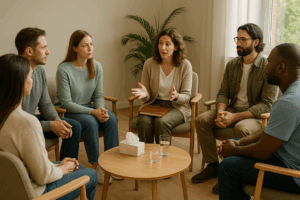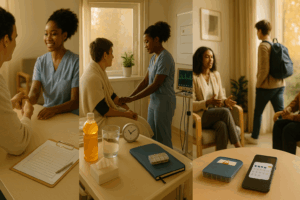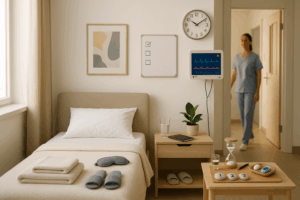Group therapy is a simple yet powerful idea that can change lives. You meet with others who are working on recovery. A trained therapist guides the time together. You share, learn, and practice skills. You also feel less alone. Research shows that group work can reduce use, build coping skills, and improve mood. It complements other treatments, such as cognitive behavioral therapy, motivational interviewing, and family therapy. National guides explain how groups provide safe structure, clear rules, and steady support. In this guide, you will learn how group therapy works, why small groups help, how family therapy adds strength, and what to do when OCD and addiction show up together. You will also see how to get the most from your first session and what top articles get right and wrong. Ready to see how group therapy can support your next step. Keep reading.
What group therapy can do that one-to-one therapy cannot.

Group therapy gives you something you cannot get alone. It gives you peers who understand your story. You learn from wins and mistakes on the same day. You try new skills in a safe room. You get honest feedback that is caring and clear. This helps your brain build new habits faster.
National guides describe many benefits. Groups offer valuable information, supportive peer interactions, and gentle encouragement to stay on track. They help people learn to cope with problems linked to substance use and daily life. They also provide structure during early recovery when routines are hard to maintain.
Why this matters
- You get many viewpoints in one hour, not just one
- You practice skills with real people, not only in your head
- You feel seen, which lowers shame and isolation
The science behind group therapy in addiction care
Group therapy is not just a nice idea. Research shows it helps adults with substance use disorders. Meta-analyses and clinical reviews report positive outcomes for group formats that teach skills, build motivation, and support behavior change. These effects intensify when groups follow clear methods and are guided by trained leaders.
National institutes also emphasize behavioral treatments as a core component of recovery. NIDA and NIAAA list group and individual counseling, cognitive behavioral therapy, contingency management, and related tools as evidence-based. These are often delivered in group settings during residential, day treatment, and outpatient care.
What the evidence supports
- Skills groups that teach coping and relapse prevention.
- Motivational groups that boost readiness and hope.
- Process groups that build insight and healthy connections.
Types of groups you may see in treatment
There is no single “right” group. Programs use a mix that fits your needs and the stage of your recovery. A typical week may include psychoeducation, skills training, and a process group. You may also join specialty groups for trauma, grief, or sleep.
SAMHSA’s TIP 41 explains several types. Psychoeducational groups teach facts and basic tools. Skills groups practice coping and problem-solving. Cognitive behavioral groups challenge unhelpful thoughts. Interpersonal process groups foster awareness in the present moment. Each type has a purpose and a clear structure, so people feel safe.
Common group formats
- Psychoeducation on cravings, triggers, and brain health
- CBT skills for thoughts, urges, and actions
- Relapse prevention planning with real-life role plays
- Process groups to practice honest talk and repair trust
Why small group therapy often works best
Smaller groups help people speak up. With fewer voices, you have more time to share and to get feedback. It is easier to feel safe and to try a new skill. Leaders can track each person and guide the flow with care.
Clinical guides do not provide a single perfect size, but they emphasize structure, safety, and trained leadership as key. Small groups make these easier to deliver. Members can follow the rules, keep confidentiality, and build trust. This is why many boutique programs opt for a lower census and smaller groups as a design choice, rather than an add-on.
What you may notice in a small group
- Faster connection and safer shares
- More time for skills practice
- Clearer feedback from peers and the therapist
How group therapy supports family healing
Addiction affects families. Parents, partners, and children carry fear and pain. Family therapy can improve engagement, retention, and outcomes. When family members learn healthy support and boundaries, stress at home drops, and recovery gets stronger. This is true in many levels of care, from inpatient to outpatient.
Group therapy and family therapy work well together. You learn skills in a group, then your family learns how to support those skills at home. This reduces the risk of mixed messages and relapse. Some programs offer multi-family groups where loved ones learn and practice together in a guided setting.
Ways families help
- Keep routines that support sleep and meals
- Use calm, direct talk instead of blame
- Learn early warning signs and who to call
When OCD and addiction show up together
OCD brings unwanted thoughts and repetitive behaviors. It can make recovery harder because anxiety can spike when you stop using. People may use substances to calm obsessions or to escape distress. That can become a loop that is hard to break without help. The good news is that treatment works. NIMH explains OCD and lists care options. SAMHSA notes that OCD often co-occurs with substance use and may worsen impairment. Integrated care is key.
Group therapy can support OCD and addiction together when the therapist guides exposure, response prevention skills, and coping tools gently. You learn to face discomfort with support. You also learn from others who manage both. This builds hope and shows that real change is possible in small steps.
If OCD is part of your picture
- Tell your therapist about obsessions and compulsions
- Ask for skills that fit OCD, like exposure and response prevention
- Practice small steps daily with support from peers
How group therapy fits special detox cases
K2 detox
K2 or Spice are synthetic cannabinoids. Batches vary and can cause severe anxiety, a fast heart rate, or psychosis. After stabilization, group work teaches grounding techniques, sleep tools, and safer coping strategies. A quiet, structured group helps people process fear and confusion from the episode. National sources warn about the risks of K2 and support careful observation in care.
Group focus after K2
- Grounding and breathing skills
- Psychoeducation on triggers and safety
- Planning for cravings and stress
Meth detox
Meth withdrawal often brings a crash with low mood, sleep changes, and strong cravings. Group sessions support rest, simple routines, and skills for early mood swings. The ASAM and AAAP guideline on stimulant use disorder highlights behavioral care and quick linkage to therapy after stabilization. Group work is central to that plan.
Group focus after meth
- Sleep hygiene and gentle activity
- Craving management with cue skills
- Hope building and small daily wins
Xanax detox
Stopping benzodiazepines like Xanax must be slow and supervised. New guidance advises small dose cuts and careful monitoring. Once a safe taper plan is set, groups teach anxiety skills, sleep skills, and body-based calming. You learn ways to cope so the taper can move at a safe pace without pushing through severe distress.
Group focus during a taper
- Skills for panic, worry, and insomnia
- Gentle exposure to feared situations
- Planning support between medical visits
What to expect in your first group
Walking into a group can feel scary. A good leader sets clear rules, explains confidentiality, and invites small steps. You can listen at first and share when ready. No one tells you what to feel. The goal is safety and steady growth.
Evidence-based groups use simple tools. You may learn how thoughts, feelings, and actions connect. You may practice a craving plan with peers. You may role-play a boundary talk with your partner. These are low-risk, high-impact steps. They prepare you for real life outside the room.
How to get ready
- Arrive a few minutes early and breathe
- Bring water and a notebook
- Set one small goal for the session
Skills you will practice in group therapy
Group work is about action. You learn to handle urges, face stress, and repair relationships. You practice in the room so your brain is ready when life gets loud.
National sources highlight core skills that are beneficial across various substances. These include stimulus control for sleep, coping plans for triggers, and problem-solving steps. You may also learn motivational skills to keep going on hard days. Behavioral treatments, such as CBT and contingency management, often utilize group formats.
Core skills to expect
- Urge surfing and delay tactics
- Sleep routines and screen limits
- Thought checkers and coping cards
- Communication steps for tough talks
How group therapy and family therapy support each other
You can build strength faster when the home team learns with you. Family therapy teaches loved ones what helps and what harms. It improves engagement and keeps people in care longer. When families learn to support routines and safe talk, stress drops at home, and relapse risk falls.
Some programs offer both group therapy for clients and family groups. Others schedule joint sessions at key times. Ask how your program brings family into the plan with your consent. This keeps everyone aligned and protects your progress.
Family topics that help
- What cravings look like and how to respond
- How to set healthy boundaries with care
- How to plan days after discharge
Getting more from every group session
Small steps add up. The secret is to show up, be honest, and try one new thing each time. You do not need to fix your whole life in one hour. Work the plan. Let the group carry you on rough days. Offer your story when you can. Your voice helps someone else heal.
Use a simple after-group routine. Write one thing you learned. Send one text to a trusted person. Do one healthy action, like a short walk. These tiny acts strengthen the new path in your brain. Over time, they build a stable week and a calmer mind.
A tiny checklist
- Attend, listen, share when ready.
- Try one skill in the room.
- Do one healthy action after the group.
- Keep your next session on the calendar.
FAQs
Is group therapy as good as individual therapy?
Both help. Research supports group therapy for adults with substance use disorders, especially when it teaches skills and follows clear methods. Many people do both at different times.
What if I hate speaking in groups
You can start by listening. Share when ready. Small groups help a lot. Leaders make space for quiet people to join safely. Over time, speaking gets easier.
Do groups help with mental health, too
Yes. Behavioral therapies like CBT and motivational interviewing help with mood, anxiety, and coping. They are often delivered in group formats. For co-occurring disorders, integrated care is most effective.
Can group therapy help after detox
Yes. Groups are a main part of day treatment and outpatient care. They help you keep skills fresh and build a support network. National guides stress quick linkage from detox to ongoing treatment, with groups included.
Next steps
You deserve care that treats you as a person, not a number. Suppose you want small, caring groups with trained leaders, plus family support and a calm setting. In that case, you can ask at Bluecrest Recovery Center. You will receive a straightforward plan that includes group therapy, follow-up care, and next steps tailored to your life. Learn more or request a confidential call at +18885650451




















